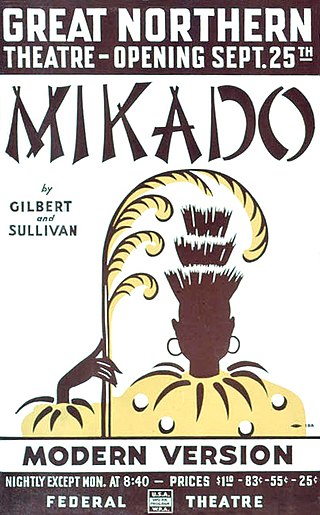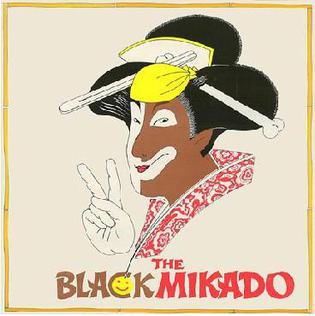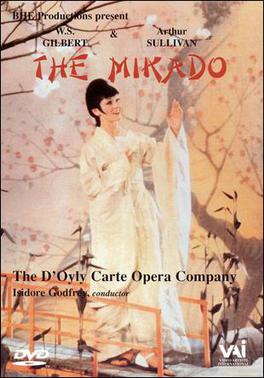
The Mikado; or, The Town of Titipu is a comic opera in two acts, with music by Arthur Sullivan and libretto by W. S. Gilbert, their ninth of fourteen operatic collaborations. It opened on 14 March 1885, in London, where it ran at the Savoy Theatre for 672 performances, the second-longest run for any work of musical theatre and one of the longest runs of any theatre piece up to that time. By the end of 1885, it was estimated that, in Europe and America, at least 150 companies were producing the opera.

Topsy-Turvy is a 1999 British musical period drama film written and directed by Mike Leigh, starring Jim Broadbent as W. S. Gilbert and Allan Corduner as Sir Arthur Sullivan, along with Timothy Spall, Lesley Manville and Ron Cook. The story concerns the 15-month period in 1884 and 1885 leading up to the premiere of Gilbert and Sullivan's The Mikado. The film focuses on the creative conflict between playwright and composer, and their decision to continue their partnership, which led to their creation of several more Savoy operas.

The Swing Mikado is a musical theatre adaptation, in two acts, of Gilbert and Sullivan's 1885 comic opera, The Mikado, with music arranged by Gentry Warden. It featured a setting transposed from Japan to a tropical island. The show was first staged by an all-black company in Chicago, Illinois, in 1938. Later that year, it transferred to Broadway. Other changes from the original work included the re-scoring of five of the musical numbers in "swing" style, the insertion of popular dance sequences including The Truck and the Cakewalk, and the rewriting of some of the dialogue in an attempt at black dialect. Other than that, the original dialogue and score of 1885 were used.

The Hot Mikado was a musical theatre adaptation of Gilbert and Sullivan's 1885 comic opera The Mikado with an African-American cast. It was first produced by Mike Todd on Broadway in 1939. It starred Bill "Bojangles" Robinson in the title role, with musical arrangements by Charles L. Cooke and direction by Hassard Short.

Hot Mikado is a musical comedy, based on Gilbert and Sullivan's 1885 comic opera The Mikado, adapted by David H. Bell and Rob Bowman. After researching the 1939 Broadway musical, The Hot Mikado, and being disappointed at the amount of surviving material that they could find, Bell and Bowman created a new adaptation, Hot Mikado. "Not much remains, however, of the 1939 show’s African-American emphasis, save the cool hipster style which even then was beginning to be eagerly pre-empted by Americans of every ethnicity."

Thomas Round was an English opera singer and actor, best known for his performances in the leading tenor roles of the Savoy Operas and grand opera.

Philip White Potter was an English singer and actor, best known for his performances in the principal tenor roles of the Savoy Operas with the D'Oyly Carte Opera Company from 1961 to 1971. Potter recorded several of his roles with D'Oyly Carte, and his performance as Nanki-Poo is preserved in the company's 1966 film of The Mikado.

Geraldine Ulmar was an American singer and actress, best known for her performances in soprano roles of the Gilbert and Sullivan operas with the D'Oyly Carte Opera Company.

George Tyrell Thorne was an English singer and actor, best known for his performances in the comic baritone roles of the Savoy Operas with the D'Oyly Carte Opera Company, especially on tour and in the original New York City productions. He married D'Oyly Carte chorister Geraldine Thompson.

The Cool Mikado is a British musical film released in 1963, directed by Michael Winner starring Frankie Howerd, Lionel Blair and Stubby Kaye. It was produced by Harold Baim, with music arranged by Martin Slavin and John Barry. The script was written by Michael Winner from an adaptation by Maurice Browning.
For nearly 150 years, Gilbert and Sullivan have pervasively influenced popular culture in the English-speaking world. Lines and quotations from the Gilbert and Sullivan operas have become part of the English language, such as "short, sharp shock", "What never? Well, hardly ever!", "let the punishment fit the crime", and "A policeman's lot is not a happy one".

Charles Eric Goulding was a British operatic tenor and actor best known for his performances with the D'Oyly Carte Opera Company in the Gilbert and Sullivan repertory.
Pauline Wales was an English singer and actress best known for her performances in the mezzo-soprano roles of the Gilbert and Sullivan operas with the D'Oyly Carte Opera Company.

The Girl Said No is a 1937 American musical comedy film produced by Andrew L. Stone and Edward L. Alperson for Grand National Pictures and directed by Andrew L. Stone. The screenplay was written by Betty Laidlaw, Robert Lively and Andrew L. Stone. The film stars Robert Armstrong, Irene Hervey and Paula Stone. It uses musical numbers from Gilbert and Sullivan operas, and the story is about a shady bookie who is in love with a greedy dance hall girl and schemes to get her back after she rejects him. Along the way, he revives a failing Gilbert and Sullivan troupe.

Ellen Sophia Taylor, known professionally as Sybil Grey, was a British singer and actress during the Victorian era best known for creating a series of minor roles in productions by the D'Oyly Carte Opera Company, including roles in several of the famous Gilbert and Sullivan operas, from 1880 to 1888. Afterwards, she went on to a long West End theatre career, appearing in both musical theatre and plays.

The Black Mikado is a musical comedy, based on Gilbert and Sullivan's The Mikado, adapted by Janos Bajtala, George Larnyoh and Eddie Quansah from W. S. Gilbert's original 1885 libretto and Arthur Sullivan's score. The show premiered on 24 April 1975 at the Cambridge Theatre in London, where it ran for 472 performances before going on a national tour. A 1976 production was mounted in Soweto, South Africa, where it played at the Diepkloof Hall. After this, the musical was not revived.

Dick Deadeye, or Duty Done is a 1975 British animated musical comedy film directed by Bill Melendez and designed by Ronald Searle, based on the 19th century comic operas of Gilbert and Sullivan.

Peggy Ann Jones is an English opera singer and actress, best known for her performances in the mezzo-soprano roles of the Savoy operas with the D'Oyly Carte Opera Company. During a fifteen-year career with that company, beginning at age 19, she was particularly known for her interpretations of the title role in Iolanthe, Pitti-Sing in The Mikado, Phoebe Meryll in The Yeomen of the Guard, and Mad Margaret in Ruddigore. She later performed on television, in films and in musicals in London's West End. Jones's best-known recordings include the role of Pitti-Sing on both the 1973 D'Oyly Carte Mikado and the company's 1966 film version of The Mikado.

The Mikado is a 1939 British musical comedy film based on Gilbert and Sullivan's 1885 comic opera The Mikado. Shot in Technicolor, the film stars Martyn Green as Ko-Ko, Sydney Granville as Pooh-Bah, the American singer Kenny Baker as Nanki-Poo and Jean Colin as Yum-Yum. Many of the other leads and choristers were or had been members of the D'Oyly Carte Opera Company.

The Mikado is a 1967 British musical film adaptation of Gilbert and Sullivan's 1885 comic opera of the same name. The film was directed by Stuart Burge and was a slightly edited adaptation of the D'Oyly Carte Opera Company's production of The Mikado and used all D'Oyly Carte singers.




















